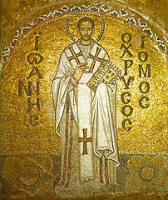
The Divine Liturgies Of Our Fathers by Saint John Chrysostom
ORTHROS
At the beginning of the Orthros, the Priest entering into the holy Bema, and putting on the Epitrachelion, saith the Blessing: and when the Anavathmoi are being sung, he entereth, together with the Deacon, within the Bema, and the Priest having blessed the Stoicharion, each putteth on his proper vestments.
According to the custom now obtaining, as soon as the Priest hath blessed, we straightway begin the Trisagion; O All-holy Trinity; Our Father; For thine is. Then the Troparia: Save thy people, O Lord. Glory; Thou that wast of thine own will; Both now; Defence, terrible; and the rest.
On Lord’s-days from the 22nd of September until the Lord’s-day of the Prodigal, on the Lord’s-day of the Palms, of the Antipasch, and of the Pentecost, on all Feasts of our Lord, and on certain others, instead of the seventeenth Kathisma of the Psalter, to wit the Amomos, there is said the Polyeleos. Now the Polyeleos of Feasts of our Lord and of the Saints consisteth of Psalms 134 and 135; Praise ye the Name of the Lord, and, Confess ye to the Lord; and that of Feasts of the Mother of God, of Psalm 44, My heart hath broken forth. Psalm 136, By the river of Babylon, is read on the Lord’s-day of the Apocreo, and on that of the Tyrine.
According to the direction of the Great Church, the place of the Gospel is either after the Prokeimenon, or after the Katabasia of the Eighth Ode of the Canons.
The Timiotera is not recited on Feasts of our Lord, or of the Mother of God (Unless the Feasts of the Theotokos fall on the Lord’s-day, for then the Timiotera is first recited, and afterwards there is sung the ninth Ode of the Feast). Likewise it is not recited on the Feast of the Three Hierarchs.
If there occur a Saint having Ainoi, instead of the two Stichoi, Arise, O Lord my God, and, I will confess to thee, O Lord, there are said proper ones, which are usually to be found in the Aposticha of the Hesperinos.
The first Troparion of the Resurrection at the end of the Great Doxology is by custom sung on every Lord’s-day. And the Ektenê and the rest is said secretly by the Priest within the Bema.
On Feasts, at, The Lord is God, there is sung the Apolytikion of the Feast; then the Psalter and the Polyeleos with the Kathismata of the Feast in order, the first Antiphon of the Anavathmoi of the fourth Tone, the Prokeimenon of the Feast, then. Let every breath, the Gospel of the Feast, the 50th Psalm with the Idiomela; and the Canons of the Feast with the Katabasiai. After the Synapte of the third Ode there is said the Kathisma (or on certain great Feasts, the Hypakoê) of the Feast; after the Synapte of the sixth Ode, the Kontakion of the Feast, likewise also the Oikos, and the Synaxarion; and after the Synapte of the ninth Ode, the Exaposteilaria of the Feast. At the Ainoi, the Prosomoia of the Feast in four; Glory; Both now; the Doxastikon of the Feast. Then the Great Doxology, and the Apolytikion of the Feast.
If there occur on the Lord’s-day a feasted Saint, at, The Lord is God, there is sung the Apolytikion of the Resurrection; Glory; of the Saint; Both now; Theotokion; then the Psalter and the Amomos (or the Polyeleos) with the Kathismata of the Resurrection, and of the Saint, the Evlogetaria, the Hypakoê of the Tone, likewise the Anavathmoi, and the Prokeimenon; the Canon of the Resurrection, and of the Saint in four, six, or eight. After the Synapte of the third One, there is first said the Kontakion of the Resurrection in monotone; and afterwards there is sung the Kathisma of the Saint, and the Theotokion; and after the Synapte of the sixth Ode, the Kontakion of the Feast, likewise the Oikos, and the Synaxarion. After the Odes there are sung the Katabasiai until the eighth. Then all the order of the Matutinal Gospel, and there is recited the Timiotera, and afterwards there is sung the Katabasia of the ninth Ode. And after the Synapte of the ninth Ode there is sung. Holy is the Lord, and the Exaposteilarion of the Resurrection; Glory; of the Saint; Both now; Theotokion, to the same Tone. At the Ainoi, four Stichera of the Resurrection, and four of the Saint; Glory; the Matutinal Doxastikon; Both now; Exceedingly blessed. Then the Great Doxology, and the Troparion; To-day is salvation.
Copyright ©1999-2023 Wildfire Fellowship, Inc all rights reserved

 Keep Site Running
Keep Site Running